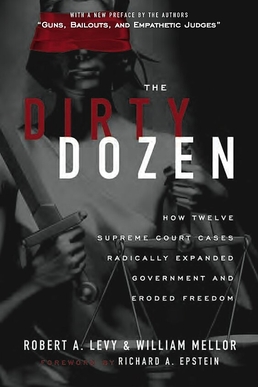Eminent domain, land acquisition, compulsory purchase, resumption, resumption/compulsory acquisition, or expropriation is the power to take private property for public use. It does not include the power to take and transfer ownership of private property from one property owner to another private property owner without a valid public purpose. This power can be legislatively delegated by the state to municipalities, government subdivisions, or even to private persons or corporations, when they are authorized to exercise the functions of public character.

The Institute for Justice (IJ) is a libertarian non-profit public interest law firm in the United States. It has litigated ten cases before the United States Supreme Court dealing with eminent domain, interstate commerce, public financing for elections, school vouchers, tax credits for private school tuition, civil asset forfeiture, and residency requirements for liquor license. The organization was founded on September 3, 1991. As of 2023, it employed a staff of 157 full-time staff members in Arlington, Virginia and seven offices across the United States.

Redevelopment is any new construction on a site that has pre-existing uses. It represents a process of land development uses to revitalize the physical, economic and social fabric of urban space.
Berman v. Parker, 348 U.S. 26 (1954), is a landmark decision of the United States Supreme Court that interpreted the Takings Clause of the Fifth Amendment to the United States Constitution. The Court voted 8–0 to hold that private property could be taken for a public purpose with just compensation. The case laid the foundation for the Court's later important public use cases, Hawaii Housing Authority v. Midkiff, 467 U.S. 229 (1984) and Kelo v. City of New London, 545 U.S. 469 (2005).
Kelo v. City of New London, 545 U.S. 469 (2005), was a landmark decision by the Supreme Court of the United States in which the Court held, 5–4, that the use of eminent domain to transfer land from one private owner to another private owner to further economic development does not violate the Takings Clause of the Fifth Amendment. In the case, plaintiff Susette Kelo sued the city of New London, Connecticut, for violating her civil rights after the city tried to acquire her house's property through eminent domain so that the land could be used as part of a "comprehensive redevelopment plan". Justice John Paul Stevens wrote for the five-justice majority that the city's use of eminent domain was permissible under the Takings Clause, because the general benefits the community would enjoy from economic growth qualified as "public use".
Inverse condemnation is a legal concept and cause of action used by property owners when a governmental entity takes an action which damages or decreases the value of private property without obtaining ownership of the property through the use of eminent domain. Thus, unlike the typical eminent domain case, the property owner is the plaintiff and not the defendant.
Hawaii Housing Authority v. Midkiff, 467 U.S. 229 (1984), was a case in which the United States Supreme Court held that a state could use eminent domain to take land that was overwhelmingly concentrated in the hands of private landowners and redistribute it to the wider population of private residents.
Constitution Park was a 2005 proposal to pursue eminent domain against the Plainfield, New Hampshire vacation estate of Supreme Court Justice Stephen Breyer, in order to construct a park commemorating the US and New Hampshire Constitutions and providing an interpretive center and lodging for visitors. It came in response to the Supreme Court decision in Kelo v. City of New London.

Oregon Ballot Measure 37 was a controversial land-use ballot initiative that passed in the U.S. state of Oregon in 2004 and is now codified as Oregon Revised Statutes (ORS) 195.305. Measure 37 has figured prominently in debates about the rights of property owners versus the public's right to enforce environmental and other land use regulations. Voters passed Measure 49 in 2007, substantially reducing the impact of Measure 37.
Howard S. Rich, also known as Howie Rich is a real estate investor who is notable for funding libertarian-oriented political initiatives such as term limits, school choice, parental rights regarding education, limited government and property rights. He has published essays advocating these positions. He established advocacy organizations such as Americans for Limited Government and U.S. Term Limits. He is the former chairman of the Legislative Education Action Drive and the Parents in Charge Foundation. Rich has been described as one of the "lower-profile moneymen in American politics" but as a prominent "force in elections across the country." Rich focuses his advocacy mostly on local issues like term limits, not on national campaigns, and doesn't see himself as leaning right or left. He is an effective advocate; National Public Radio identified Rich as a leader behind the independent groups with potential to influence elections.

Arizona Proposition 207, a 2006 ballot initiative officially titled the Private Property Rights Protection Act, requires the government to reimburse land owners when regulations result in a decrease in the property's value, and also prevents government from exercising eminent domain on behalf of a private party. It was approved by a 64.8% margin. The land use portion of this proposition is similar to Oregon's 2004 Ballot Measure 37, and the eminent domain portion is similar to initiatives advanced in numerous states following the 2005 US Supreme Court decision in Kelo v. City of New London.
Scott G. Bullock is an American lawyer who focuses on property rights issues such as eminent domain and civil forfeiture. He has been president and General Counsel at the Institute for Justice since 2016, a nonprofit libertarian public interest law firm. He represented Susette Kelo in Kelo v. City of New London, an eminent domain case decided by the Supreme Court in 2005. Bullock was a senior attorney before becoming the president of the institute and directed many cases on state and federal level. In 1994 he represented the institute in a forum on C-SPAN.
Dana Berliner is Litigation Director at the Institute for Justice, a public interest law firm in Arlington, Virginia founded in 1991 by Chip Mellor and Clint Bolick. She was co-lead counsel for Susette Kelo in the landmark United States Supreme Court case Kelo v. City of New London.

California Propositions 98 and 99 were competing ballot propositions in the U.S. state of California to limit the use of eminent domain and possibly rent control. They were voted on June 3, 2008; proposition 98 failed, while proposition 99 passed.

The Dirty Dozen: How Twelve Supreme Court Cases Radically Expanded Government and Eroded Freedom is a Cato Institute book, written by Robert A. Levy and William Mellor and released in May 2008, about twelve U.S. Supreme Court decisions that were viewed as greatly undermining individual freedom by expanding the power of government. The book was the subject of many reviews and much press. It was released around the time that Levy gained media attention as the organizer and financier behind District of Columbia v. Heller.
The Brigham–Kanner Property Rights Prize is awarded each Fall by the William & Mary Law School, at the Brigham-Kanner Property Rights Conference. The Conference and Prize were proposed in 2003 by Joseph T. Waldo, a graduate of the Marshall-Wythe School of Law with the support of the then Dean of the Law School, W. Taylor Reveley, III, who would later become president of the college. The Conference and Prize were inaugurated in 2004. The Conference and Prize are named after Toby Prince Brigham and Gideon Kanner for "their contributions to private property rights, their efforts to advance the constitutional protection of property, and their accomplishments in preserving the important role that private property plays in protecting individual and civil rights." Toby Prince Brigham is a founding partner of Brigham Moore in Florida. Gideon Kanner is professor of law emeritus at the Loyola Law School in Los Angeles. The Brigham-Kanner Prize is awarded annually during the Brigham-Kanner Property Rights Conference.

Empress Casino Joliet Corporation v. Giannoulias, 231 Ill.2d 62, 896 N.E.2d 277 (2008), is a case from Supreme Court of Illinois in which four casinos challenged a tax imposed by Public Act 94-804. The Act was challenged on the grounds that it was an unconstitutional taking. The Court held categorically that a tax could never be a taking within the meaning of the Fifth Amendment to the Constitution.
Public use is a legal requirement under the Takings Clause of the Fifth Amendment of the U.S. Constitution, that owners of property seized by eminent domain for "public use" be paid "just compensation."

Ilya Somin is a law professor at George Mason University, B. Kenneth Simon Chair in Constitutional Studies at the Cato Institute, a blogger for the Volokh Conspiracy, and a former co-editor of the Supreme Court Economic Review (2006–2013). His research focuses on constitutional law, property law, migration rights, and the study of popular political participation and its implications for constitutional democracy.
In the United States, eminent domain is the power of a state or the federal government to take private property for public use while requiring just compensation to be given to the original owner. It can be legislatively delegated by the state to municipalities, government subdivisions, or even to private persons or corporations, when they are authorized to exercise the functions of public character.








